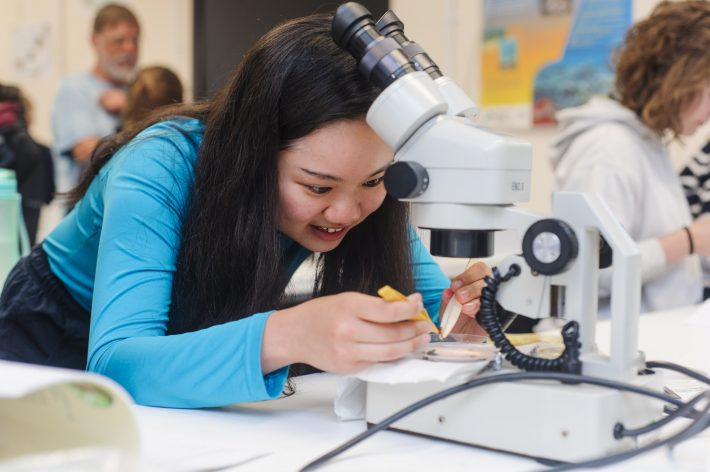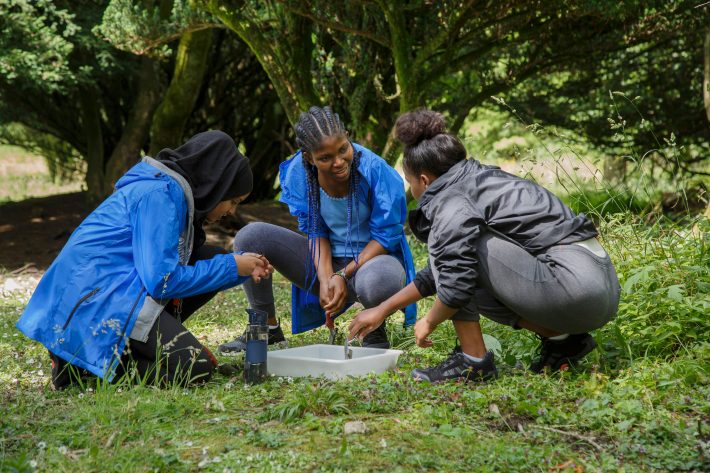Inspiring the next generation
Students from low-income and ethnic minority backgrounds get an unrivalled opportunity to experience ecology in the field on our summer school. Just don’t expect a relaxing time…

With early morning birdwatching, days of field working and lab sessions and evenings of discussing their findings with experts and mentors, it’s no wonder the 16–18 year-old students come back exhausted from the British Ecological Society summer school.
This July, around 30 students from schools around the country descended on a field studies centre in Malham tarn in the Yorkshire Dales. The week-long residential course provided them with an incredible opportunity to delve into the world of ecology and its relevance to many of the challenges facing us today.
Never heard the word ‘ecology’
Whether they came from different ethnic backgrounds, schools in low-income areas or families where they might be the first to go to university, the students got to know each other quickly as they launched straight into the sessions.
“We want to take students from these backgrounds and expose them to the relevance of ecology in our world and the breadth of opportunities open to them,” explains Karen Devine, who led the summer school and is Head of External Affairs at the British Ecological Society. “The majority come never having heard the word ‘ecology’, never mind considered taking a course in ecology at university.”
“Amazing to meet so many committed scientists who have exposed me to experiences I would never have had the opportunity to do.”
– Summer school student
This was the second year a summer school for 16–18 year-olds had been run. It uses a successful formula building on a similar school for undergraduates which offers field studies experience for those who may not otherwise get the opportunity.
A typical day involves starting with a session that focuses purely on the science, followed by an example of how that science is used. For example, this year a researcher led the group through a freshwater ecological habitat. Then Environment Agency staff did a hands-on task about mapping flooding locations locally, and students made decisions on where to build houses and where to allocate flood defences.
Learning from experts, support from mentors
The students get to work with experts who really know their stuff, talk to university students who help as mentors and hear about a whole range of careers available in ecology. It gives a really rounded picture of ecology all the while being immersed in the surrounding nature. Many become committed to pursuing careers in our science.
“They spend time with ecologists who they can ask about anything, who are passionate about what they do,” says Karen. “They think ‘I can be that person’ and that changes everything for them.”
“I just love it.”
Phoebe Whitehead, who’s studying human sciences at Oxford University, is a regular: “I just love it.” She’s been on summer schools as an A-level student and an undergraduate, before coming to Malham this year as a mentor. She explains that the role of a mentor is “just to be there for students and help when needed.”
“Being a mentor is about being a friendly face,” agrees Rohit Bangay, another student mentor. “For me, the summer school exposes people to lots of different aspects of ecology,” he explains, often in ways that students aren’t exposed to in school.
“Who needs sleep when you can do ecology?”
– Summer school student
Phoebe often found herself talking about her path to university with the students: “I was the first person to go to uni in my family. I had no idea what I wanted to do and made bad decisions when applying.” Phoebe explains that she initially picked courses that sounded interesting but later realised she would hate them. “I took a gap year and changed it all round afterwards. The students at Malham liked this, hearing you can take time to thing and find what you’re interested in.”
Ro had an unconventional path into ecology too. It was after having a gun pulled on him while working in a betting shop that Ro knew he wanted to do something different. Now 28 and a mature student at Royal Holloway, he is passionate about the science and nature he loves, spending the summer researching the diversity and abundance of butterflies on brownfield sites in London.

Supporting the next generation
“It’s inspirational really,” says John Condron, who with his wife Naomi has supported this year’s summer school. John and Naomi are directors of consultancy firm Ecology Resources Ltd, a company they founded three years ago. They’ve provided a bursary for a student to invest in the equipment, books or field courses they may need in pursuing a career. “It’s great to see a lot of diversity,” John says on their visit to the course in Malham. “Ecology can be a very white, middle-class industry.”
“From what I’ve seen, the summer school reaches out to groups of students that otherwise would not have the same access as some of their peers,” says John. “That’s very important. It can open up the eyes of kids to nature, ecology and wildlife.”
Opening more eyes to ecology
We want to thank everyone who has given to our ‘Ecology – the next generation’ appeal, which has helped support these summer schools. The schools have an important role in broadening many students’ horizons to ecology and the natural world. It’s also a real opportunity to gain new experiences and mix with others from around the country and from different cultures.
The more support we receive, the more we can widen our reach and resources to offer these students. Ten years into the future, the hope is this will help create a more diverse community of ecologists all set on tackling global challenges in biodiversity, urban infrastructure, food security and much more.
Like what we stand for?
Support our mission and help develop the next generation of ecologists by donating to the British Ecological Society.